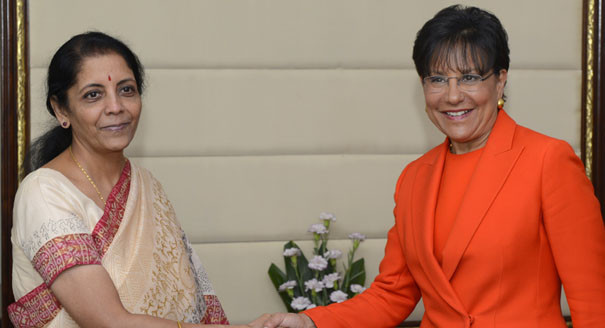Registration
You will receive an email confirming your registration.
To initiate an exciting week of efforts between the United States and India to strengthen bilateral relations, Carnegie hosted a half-day conference to discuss the prospects for transformed economic ties between the two countries. Join the conversation on Twitter with #USIndiaForward.
Ready for Takeoff
A conversation with U.S. Secretary of Commerce Penny Pritzker and Indian Minister of State (Independent Charge) for Commerce and Industry Nirmala Sitharaman.
The first panel featured a conversation with U.S. Secretary of Commerce Penny Pritzker and Indian Minister of State (Independent Charge) for Commerce and Industry Nirmala Sitharaman. Secretary Pritzker began by stressing the interconnectedness of the U.S. and Indian markets, alluding to the importance of the first ever U.S.-India Strategic and Commercial Dialogue being held this week. She affirmed the U.S. government’s intent to make it easier for foreign and domestic firms to do business in India and the United States, and deepen ties of trade and strengthen bilateral commercial bonds in ways that benefit workers and firms in both countries.
Minister Sitharaman emphasized that with the political will of Prime Minister Modi, India is speedily becoming a more investor-friendly country and shedding its reputation for unnecessary bureaucracy and red-tape. Carnegie President William J. Burns moderated.
William J. Burns
William J. Burns is president of the Carnegie Endowment for International Peace, the oldest international affairs think tank in the United States.
Penny Pritzker
Penny Pritzker has served as the 38th U.S. secretary of commerce since being sworn in by Vice President Joe Biden on June 26, 2013.
Nirmala Sitharaman
Nirmala Sitharaman is the minister of state (independent charge) for commerce and industry of India.
Deepening Bilateral Economic Engagement: U.S. and Indian CEOs Speak
Both India and the United States should address low-hanging fruit—dispute resolution, intellectual property, and taxation—to facilitate immediate trade gains for both economies.
The discussion between the U.S. and Indian CEOs focused on the ease of doing business in India. Private sector leaders from both nations affirmed the tremendous energy of the India-U.S. dialogue, while expressing concern about the lack of a responsive bureaucracy and appropriate policy frameworks for increased collaboration.
With an eye towards the future, the CEOs recommended that both governments address low-hanging fruit—dispute resolution, intellectual property, and taxation—to facilitate immediate trade gains for both economies. Michael S. Burke, David M. Cote, Charles R. Kaye, Kiran Mazumdar Shah and Sunil Bharti Mittal participated in the discussion. Boeing’s W. James McNerney moderated.
W. James McNerney, Jr.
W. James (Jim) McNerney, Jr. is chairman of the board of The Boeing Company. McNerney joined Boeing as chairman, president, and CEO on July 1, 2005. He served as president until December 2013 and CEO until July 2015.
Michael S. Burke
Michael S. Burke is chairman and chief executive officer of AECOM, a $19 billion, fully integrated infrastructure and support services firm with the ability to design, build, finance and operate infrastructure assets globally.
David M. Cote
David M. Cote is chairman and chief executive officer of Honeywell, a $40 billion diversified technology and manufacturing leader.
Charles R. Kaye
Charles R. Kaye is co-chief executive officer of Warburg Pincus. He has been with Warburg Pincus since 1986 and has been jointly responsible for the management of the firm since 2000.
Kiran Mazumdar-Shaw
Kiran Mazumdar-Shaw is the chairperson and managing director of Biocon, Asia's leading bio-pharmaceuticals enterprise and a pioneering biotech entrepreneur.
Sunil Bharti Mittal
Sunil Bharti Mittal is the founder and chairman of Bharti Enterprises which has interests in telecom, retail, realty, financial services and agri-products. He also serves on the board of the Carnegie Endowment for International Peace.
Cyrus P. Mistry
Cyrus P. Mistry was appointed as the chairman of the Tata Sons board in December 2012. He has been a director of the company since 2006.
David M. Cote
Michael S. Burke
Charles R. Kaye
Kiran Mazumdar-Shaw
Cyrus P. Mistry
Sunil Bharti Mittal
W. James McNerney, Jr.
The Economic and Strategic Imperatives of Enhanced Bilateral Trade
U.S. economic policy in India needs to be reconciled with its strategic policy in Asia.
Pravin Krishna of the School of Advanced International Studies at Johns Hopkins University opened the discussion with a brief, impactful overview of India’s trade policy. C. Fred Bergsten, elaborating upon the findings of a new Peterson Institute report, underlined the urgency for India to participate in external trade agreements to improve its trade competitiveness and create jobs for a burgeoning labor force. Carnegie’s Ashley Tellis presented a strategic rationale for greater bilateral trade, arguing for the reconciliation of U.S. economic policy in India with its strategic policy in Asia. Edward Luce of the Financial Times moderated.
Edward Luce
Edward Luce is the Washington columnist and commentator for the Financial Times. Ed has worked for the Financial Times since 1995 as Philippines correspondent, capital markets editor, South Asia bureau chief in New Delhi and Washington bureau chief between 2006 and 2011.
C. Fred Bergsten
C. Fred Bergsten is a senior fellow and the director emeritus of the Peterson Institute for International Economics. He was the founding director from 1981 to 2012.
Pravin Krishna
Pravin Krishna is the Chung Ju Yung distinguished professor of international economics and business at Johns Hopkins University, where he is jointly appointed in the School of Advanced International Studies (SAIS) in Washington, DC and the Department of Economics in the Zanvyl Krieger School of Arts and Sciences (KSAS) in Baltimore.
Ashley J. Tellis
Ashley J. Tellis is a senior associate at the Carnegie Endowment for International Peace specializing in international security, defense, and Asian strategic issues.
